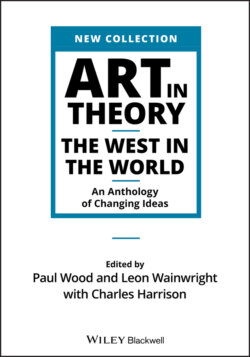Читать книгу Art in Theory - Группа авторов - Страница 110
Discourse 2
ОглавлениеWhoever travels in Asia, especially if he be conversant with the literature of the countries through which he passes, must naturally remark the superiority of European talents: the observation, indeed, is at least as old as ALEXANDER; and, though we cannot agree with the sage preceptor [i.e. Aristotle] of that ambitious Prince, that ‘the Asiaticks are born to be slaves,’ yet the Athenian poet [i.e. Aeschylus] seems perfectly in the right, when he represents Europe as a sovereign Princess, and Asia as her handmaid: but, if the mistress be transcendently majestic, it cannot be denied that the attendant has many beauties, and some advantages peculiar to herself … [A]lthough we must be conscious of our superior advancement in all kinds of useful knowledge, yet we ought not therefore to contemn the people of Asia, from whose researches into nature, works of arts and inventions of fancy, many valuable hints may be derived for our own improvement and advantage. If that, indeed were not the principal object of your institution, little else could arise from it but the mere gratification of curiosity. […]
To form an exact parallel between the works and actions of the Western and Eastern worlds, would require a tract of no inconsiderable length; but we may decide on the whole, that reason and taste are the grand prerogatives of European minds, while the Asiaticks have soared to loftier heights in the sphere of imagination.
* * *
In those elegant arts, which are called fine and liberal, though of less general utility than the labours of the mechanick, it is really wonderful how much a single nation has excelled the whole world: I mean the ancient Greeks, whose Sculpture, of which we have exquisite remains both on gems and in marble, no modern tool can equal; whose Architecture we can only imitate at a servile distance, but are unable to make one addition to it, without destroying its graceful simplicity; whose Poetry still delights us in youth, and amuses us at a mature age; and of whose Painting and Musick we have the concurrent relations of so many grave authors, that it would be strange incredulity to doubt their excellence.
Painting, as an art belonging to the powers of imagination, or what is commonly called Genius, appears to be yet in its infancy among the people of the East: but the Hindu system of musick has, I believe, been formed on truer principles than our own; and all the skill of the native composers is directed to the great object of their art, the natural expression of strong passions, to which melody, indeed, is often sacrificed: though some of their tunes are pleasing even to an European ear. […]
The poetical works of the Arabs and Persians, which differ surprisingly in their style and form, are here pretty generally known … [W]e may safely say of them, what ABULFAZL pronounces of the Mahábhárat, that, ‘although they abound with extravagant images and descriptions, they are in the highest degree entertaining and instructive.’ … If we may form a just opinion of the Sanscrit poetry from the specimens already exhibited, (though we can only judge perfectly by consulting the originals), we cannot but thirst for the whole work of VYA’SA, with which a member of our society … will in due time gratify the publick. […]
No specimens of genuine Oratory can be expected from nations among whom the form of government precludes even the idea of popular eloquence; but the art of writing, in elegant and modulated periods, has been cultivated in Asia from the earliest ages the Vèda’s as well as the Alcoran, are written in measured prose; and the compositions of ISOCRATES are not more highly polished than those of the best Arabian and Persian authors.
Of the Hindu and Muselman architecture there are yet many noble remains in Bahar, and some in the vicinity of Malda; nor am I unwilling to believe, that even those ruins, of which you will, I trust, be presented with correct delineations, may furnish our own architects with new ideas of beauty and sublimity.
